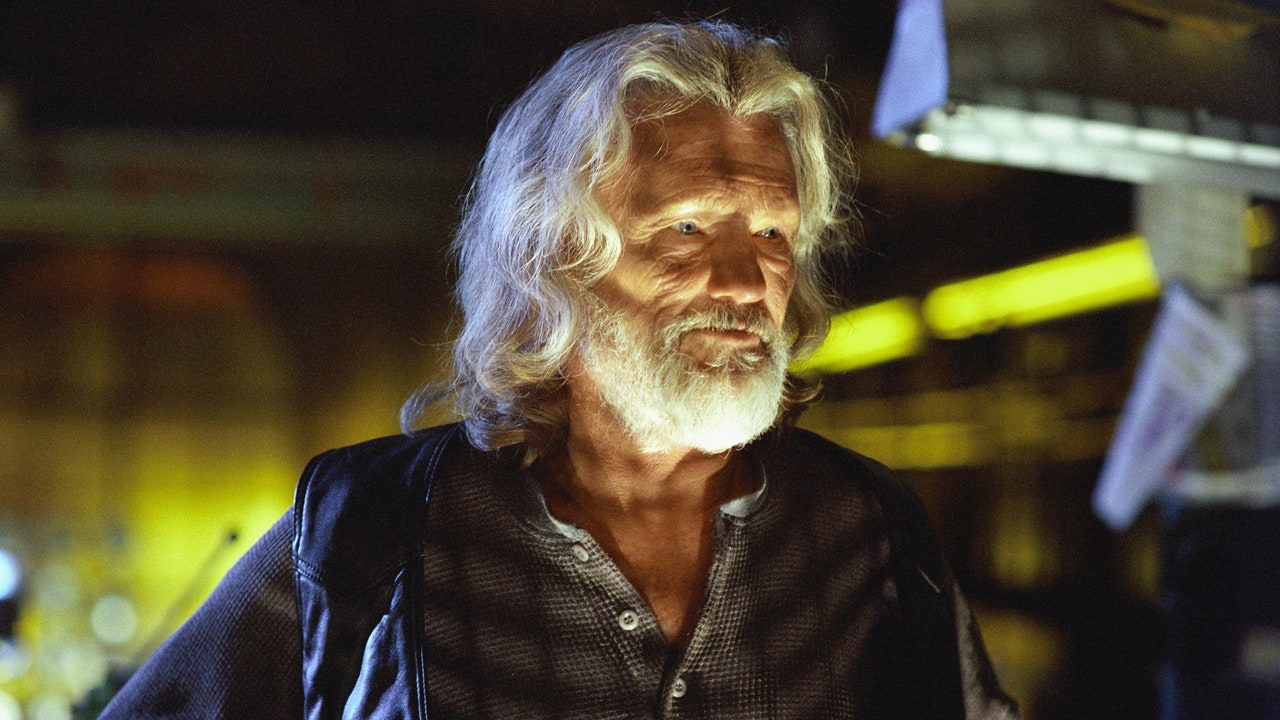Second, and more importantly, because Kristofferson was the ne plus ultra of fearless American entertainers, his appearance in a stock role in a vampire comic movie created a permission structure for other actors. You may hold your craft in high regard, whether by a Yale MFA or a strong run in a Susan Lori-Parks drama. But you too can dive into the technicolor muck of comic book movies, grab the bag, throw in some moves that you cultivated during your run in Topdog /Underdog, and emerge with an unscathed reputation. After all, Kris goddamn Kristofferson was talking about silver nitrate and blood serums a minute ago.
In the first Blade, Whistler delivers a standard issue expository monologue about vampires to the audience surrogate / love interest (N’Bushe Wright) while he wears a tank top and leather vest like a ‘70s wrestling heel. That Kristofferson can sell a big blue flashlight as an ultraviolet vampire death beam is one thing, but when he outlines the power of the vampires by saying “they own the police,” you hear Faye Dunaway saying the same line in Chinatown and you wonder who said it better. When Kristofferson sends Wright on her way he says “Take care” with a battered warmth that feels like the last line of Witness. Later in the movie, he rescues Blade from vampire henchmen by busting through a wall like Cormac McCarthy’s version of the Kool-Aid Man, firing a machine gun and crowing, “Catch you fuckers at a bad time?”
The entire proof of concept for the extended universes of comic movies depended on legit actors taking on D-list characters and selling them to the world at large. When Jack Nicholson played the Joker, that was a brand meeting another brand. Kristofferson took a character that had appeared in one episode of the Spider-Man animated show on Fox and delivered such a fun, distinct performance that the original Blade employed the classic “off screen death?” slight-of-hand to leave room for Kristofferson in the sequel. That became the enticement to real actors to take on Sandman and Pyro and other minor characters: flip this part from meh to memorable, and you can pay your bills for a decade. And if it doesn’t have legs, you’re still getting paid, and your IMDB now has a fun asterisk. You think you’re too good for this? Kris Kristofferson did it, and he’s the last outlaw. It wasn’t until even the movies for the ancillary characters were planned out years in advance and directors started telling journalists that the Blue Beetle movie was heavily influenced by Days of Heaven and all the universes became pro forma line items that the system collapsed.
When Kristofferson returns in Blade II, delight and absurdity reign. Whistler has been rescued from a vampire blood farm and arrives to see all these young “shit birds” now working with Blade. When he collars Norman Reedus’s wormy hacker for speaking out of turn, he’s changed Whistler from the confident, fatalistic father figure in the original (Pedro Pascal, you may remit your royalty checks to the Kristofferson estate) to an out-of-time geezer. It’s great acting, but what matters is that it’s the guy from Heaven’s Gate, one of America’s masters of embodying defeat and aging, doing heavy lifting in a Blade sequel. A few minutes later he’s bantering with Ron Perlman and you think, I would pay $10,000 dollars to see these guys do American Buffalo.
Kristofferson’s genius needs no special defense. In a wild turn of casting serendipity his gravitas as an anti-establishment icon became a blueprint for knitting together entries in the most lucrative movie franchise of their era. Kristofferson said he had fun doing these movies, that parenting his kids helped him understand Whistler’s relationship to Blade. I believe that because everything he did was a testament to relentless honesty. The true test of genius is to hit a target no one else can see. Kris Kristofferson made a life of doing that in art and in politics and in the simple, nearly impossible act of living a few truths consistently.
When Wesley Snipes tweeted his condolences and memories about working with Kristofferson, he wrote how Kristofferson taught him that “real fun and fame is having a beautiful family and it takes bravery to be a good human with so many vampires running around.” Even when Kris Kristofferson was unknowingly creating a niche on which an entire era of billion-dollar movies would depend, he brought real life into everything he touched.

